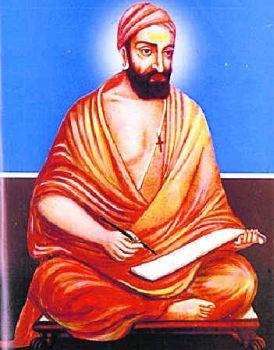 Robert De Nobili was born in Tuscany, Italy, of a rich and influential family and entered the Society of Jesus in spite of their opposition in 1597. He came to India in 1604, and in the following year settled at Madurai.
Robert De Nobili was born in Tuscany, Italy, of a rich and influential family and entered the Society of Jesus in spite of their opposition in 1597. He came to India in 1604, and in the following year settled at Madurai.Finding that almost everywhere Christian converts were mainly from the lower castes and that the community were regarded as de-nationalized and were looked down upon, he set himself to use new methods of evangelism aimed especially at the Brahmains and higher castes—though it should be remembered that he did not neglect to make for the lower castes also. He learned Sanskrit, Tamil and Telegu and studied Indian philosophy and religious literature. He separated himself from his fellow missionary, lived in the Brahmin quarter, and adopted the dress, diet and manner of life of Sanyasi. He even accepted some aspects of the caste system as justifiable. These methods won him a number of Brahmain converts, but aroused the opposition of his fellow priests. He was accused of watering down Christianity and had to defend himself before the Archbishop of Goa. He did this so ably that he received papal permission to continue.
But this decision settled the matter only temporarily. After working 38 years in Madurai, he was ordered by his superior to leave, and went to Jaffna in Sri Lanka. In 1648 he returned to India, settling at Mylapore, and spent his last years there almost blind and in great poverty. He died in 1656. His motto had been: “To open the door of India to Christ.” He baptized about 600 high-caste Hindus.
We can see today that there was much in De Nobili’s approach that was right; but he was a man before his time. We may add a tribute paid to another aspect of his work by the Christians in India—“much of De Nobili’s time was spent in building up, in both prose and verse, a Christian literature to which his converts could add, and which has indeed been the foundation of all Christian literature in South India.
We should pray that in our day the church may be rightly guided in its policy of indigenization, so that all that is good and God-given in our culture and traditions of spirituality may be baptized into Christ and be preserved and used for the enrichment of our worship and theology, and to the glory of God.
This article is taken from a little book written by R.W. Bryan a Bishop of the Church of North India. The book tells the life of great Christians that the Indian Church commemorates in their liturgical worship.
.jpg)



No comments:
Post a Comment